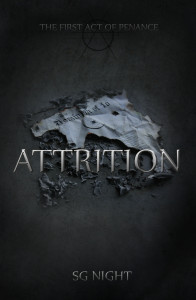Interview – S.G. Night, author of Attrition: The First Act of Penance
Self-Publisher’s Showcase: Today we are joined in the Showcase Lounge by the author of upcoming fantasy novel Attrition: The First Act of Penance. Welcome S.G. Night.
S.G. Night: Thanks, Paul, glad to be here.
SPS: For those unfamiliar with this particular young upcoming writer from Northern Virginia, care to tell us a little about yourself?
SGN: Well, to start, I guess you could say that I’m on the younger end of the spectrum. I finished the first draft of Attrition in this past March — 2013 — just a few days before I turned 18. I started my forays into writing very early, when I was only about six or seven. My older brother, an avid reader and a writer himself, originally got me onto Science Fiction and Fantasy, and I’ve been in love with the genre ever since. As I got older, I participated in a lot of honors programs in school, particularly focusing on technical, analytical writing and critical reading. And as I learned to read and analyze the works of other writers’ — pick them apart, find out what made them good or bad — those skills spilled over into my own writing. The story for Attrition has been building up in my head for most of my life, and I spent years developing the characters, world, and plot. In July of last year, I decided I was finally ready to write the thing once and for all. So here I am a year later, soon to be published through Amazon.
SPS: So Sam, you’re diving straight into published work with an Epic Fantasy Novel. What can we expect from Attrition: The first Act of Penance?
SGN: Like you said, Attrition is an Epic Fantasy, set in it’s own unique world. It’s a story of a conquered nation, living under the tyranny of the dark powers that invaded a century prior. For the most part, Attrition follows the few surviving Majiski, a race of warrior-mages that was nearly completely exterminated after the invasion , who live in hiding and fight against their oppressors. The story’s got intrigue, assassination, war, politics, magic, conspiracy — all the good stuff.
SPS: Was there ever a time that you had doubts about your decision to start with such a large undertaking?
SGN: There have definitely been times that I’ve looked back at what I’ve written and felt my ego deflate a bit. More than once I’ve said to myself “What are you doing? You can’t do this, you can’t compete with the stuff that real professional authors write. You’re just a kid.” But that only gets me riled up and pushes me onward. A career as a writer has been my dream for most of my life, and I don’t plan on giving up on it.
SPS: In the description of the novel, you mention the organization known as the Genshwin. Could you tell us a bit about them?
SGN: The Genshwin are most of the remaining Majiski. They’re assassins, spies, thieves, mercenaries. They fight against the Demonic Dominion in secret, but simultaneously have to struggle just to keep themselves alive.
SPS: Tell us a little about the leading character, Racath Thanjel.
SGN: Racath is the best and brightest of the Genshwin — the fastest, the most effective, the guy everyone else fears and respects. He’s also only 19 years old. And as the story develops, it becomes clear that he is destined to be instrumental in the fight against the Dominion.
SPS: Racath seems to have a habit of defying the Genshwin Patriarch’s laws of discretion. What does this tell us about what kind of person he is?
SGN: Racath’s a bit of a rebel, it’s true. As an assassin, he can be bit volatile, and sometimes even a little vicious. But it’s important to understand why he does what he does. The most essential part of Racath’s character is that he cannot stand the idea of allowing an innocent person to be oppressed or victimized. Not only does he believe in protecting the weak, he believes in avenging them, too. This impulse drives him to step between the Dominion and the Humans every now and then, breaking the Genshwins’ veil of secrecy, against the will of his discretion-obsessed master. This brings the two of them into conflict over one of the book’s central themes: is it better to survive in the dark, or to die fighting in the light?
SPS: Do you think this is a glimpse of the writer’s character? Do you identify with the way Racath thinks and behaves?
SGN: Probably the most important thing about the way I wrote the book, is that while Racath is the main character, he isn’t the narrator. The narrator, who remains mostly anonymous for the first portion of the book, is writing Racath’s story, almost like a prosaic biography, and it’s clear from the first few pages that he holds Racath in high regard. In this way, I identify more with the narrator’s character than Racath’s. I have a profound admiration for Racath, much like the narrator does, and I sometimes wish I was as selfless as him, or as willing to stand up for other people. I also relate to the narrator’s position as he writes the story: from the outside looking in as he tells someone else’s tale. The narrator often emphasizes that “This is not [his] story”, and I feel much the same way; this isn’t my story, it’s Racath’s. I’m just the conduit.
SPS: Attrition is the first instalment of the Three Acts of Penance. What can we expect in the next two chapters?
SGN: Definitely the furtherance of Racath’s struggle against the Dominion, and the rise of the revolution that has been building for so long. The narrator also steps in to play a much larger 1st-person role in Book II. You’ll also be getting a better glimpse at the meaning behind the title: the unveiling of the century-old sins that caused the invasion itself and brought everyone to where they are today — and the painful road to absolution, and making things right again.
SPS: Was the Self-Published/Indie-Published route always your preferred route for your work?
SGN: Years ago, when I was just a kid with a dream of writing a story, no. Back then, I wanted to go the traditional route. But as I got older, I began to understand the kind of things you have to give up when you let a publisher take over. Began to realize just how many authors sit unnoticed on dusty old shelves, passed-over and unrecognized. But now, thanks to the internet, even we who self-publish can find not only independence, but success. Amazon’s CreateSpace platform has helped countless indie writers publish their work, market it to a wide audience, and actually make sales. The royalties aren’t bad either!
SPS: What has been the reaction of family and friends so far?
SGN: In general, very supportive. I’ve always been surrounded by loving, encouraging people. My parents helped provide the means to get this book done. My brother’s always been a source of savvy advice and honest edits. My older sister is helping with some of the more interpersonal aspects of the launch and future events, such as the possibility of book-signings in the coming months if Attrition really takes off. And of course a close circle of friends who’ve always been interested and enthusiastic — nothing makes a writer feel better than people who ask to read their stuff.
SPS: Do you have any plans in the future to venture into any other genres?
SGN: Possibly. Aside from the Three Acts of Penance, I’ve got a whole bunch of stories planned set in this particular world of fantasy –some involving Racath and his companions, others entirely separate. I’ve got some stand-alone stuff brewing in the back of my head, too, but that’ll have to wait until later. Needless to say, though, I plan on writing for a long, long time.
SPS: Before we let you escape, it’s your chance to name-drop. Anyone who you feel is deserving of more recognition at present or someone whose writing you have recently enjoyed? Now is your chance to spread the word…
SGN: Definitely a hat-tip to Patrick Rothfuss and his Kingkiller Chronicle, who influenced a lot of my writing style and world development. Ditto to KJ Parker — The Engineer Trilogy and The Folding Knife played a big part of turning me into the cynic I am today. And certainly Brent Weeks for The Night Angel Trilogy in regards to storytelling and character development. I wouldn’t be the writer I am today if not for their work.
SPS: It’s been great to catch up, Sam. Good luck with Attrition. Thank you for joining us today.
SGN: My pleasure, Paul, thanks for having me.















Leave a Reply